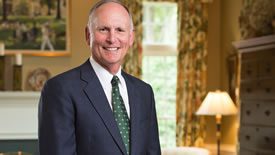Chancellor among Most Admired CEOs in Charlotte

Chancellor Philip L. Dubois recently accepted an award from the Charlotte Business Journal as one of the area’s Most Admired CEOs. He was one of two recipients in the education category. In total, the business publication recognized 35 local leaders in 18 industry categories, including trustee Susan DeVore ’81 of Premier Inc.
The Charlotte Business Journal profiled the chancellor in a special report; read excerpts below.
Please tell us what leadership and being a leader means to you.
Leadership starts with unbridled passion for the mission of your company or enterprise. In my case, participating in post-secondary education as a first-generation college student opened up opportunities I could not have imagined. My team and I wake up every day committed to ensuring every student willing to make the commitment to earn his or her college degree has the best experience possible. We try to do that with a strong strategic planning process; an aligned allocation of our funding, physical assets, and time to advance our strategic priorities; and holding ourselves accountable to our many constituencies, including elected officials, our governing boards, our employees, alumni and current students, and the larger community we serve.
What are the keys to CEOs building a high level of trust in their organizations?
We operate under a set of internal administrative operating principles and values built around the mission, collaborative and transparent consultation with those potentially affected by a decision, clear communication, exemplary execution, personal and institutional integrity, and a cultural bent toward making decisions that are always in the best long-term interests of the institution.
Please explain how you and your organization make tough decisions.
UNC Charlotte has an organizational and governance structure that allows for input from various groups throughout the university community. I have a Chancellor’s Cabinet that meets weekly and is responsible for advising me on many of the operational decisions of the university. This group includes the vice chancellors who lead the various university divisions as well as the senior staff in my office, university communications and government and community affairs. We attempt as best we can to follow our administrative operating principles and values and, as time may permit, work closely with our trustees and the faculty, staff, and student governance groups to make sure their perspectives are considered during our deliberations. We are also highly data-driven, although intuition and experience always come into play. At the end of the day, I take all of the advice I have heard and move ahead with what I believe is the best decision.
Please give some details about one of your top accomplishments of the past year that you are most proud of.
Just about a year ago, UNC Charlotte celebrated the completion of a transformative project that began right after I became chancellor in 2005. Thirteen years later, the northeast extension of the CATS light rail line finally arrived on campus, providing unprecedented connectivity between the university and the Charlotte community. This project was a monumental undertaking, involving a cast of hundreds if not thousands of people who worked for the university, the city and CATS. We were also able to preserve the project notwithstanding the recession and a referendum that threatened to repeal the sales tax increment needed to build and operate the system. Taking my first ride last March stands out as one of the highlights of my career.
How is your organization changing or adapting to prepare for the future?
We are tossed about constantly by economic conditions, the winds of political change, the emergence of new educational needs, increasing sophistication in computing and technology, etc. It is complicated by our being the fastest-growing campus by enrollment in the UNC system, having grown more than 40% since 2005 and having invested more than $1.2 billion in facility construction and renovation. That will continue from our current enrollment of 29,710 students to 35,000 by 2025 and perhaps more beyond that. This kind of sustained growth has been possible only through a commitment to our strategic plan and the willingness to change course as new circumstances demand or new opportunities emerge. What we might take for granted today—like having light rail and a football team, was not on the table for discussion when I arrived in 2005.
What top piece of advice would you share with other CEOs?
Surround yourself with smart and competent people, listen as much as you can stand, and don’t take yourself too seriously. Humor is a powerful tool if used correctly and it usually requires the CEO to be seen as someone who is having fun.